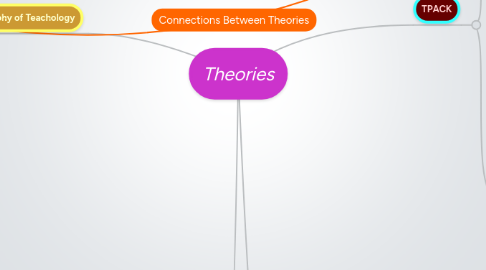
1. Technology Theories
1.1. SCOT
1.1.1. Implications for Education
1.1.1.1. Using technology as a guide to help social learners develop a better understanding.
1.1.2. Basic Principles
1.1.2.1. Technology doesn't effect human action but human action shapes technology.
1.1.2.2. You can not understand technology without fully understanding how technology is rooted in its social context.
1.1.2.3. Social Construction of Education
1.2. Media Ecology
1.2.1. Implications for Education
1.2.1.1. Social media sites such as a discussion board or Twitter or Facebook will help with learning.
1.2.2. Basic Principles
1.2.2.1. Humans effect technology.
1.2.2.2. Many definitions of Media Ecology.
1.2.2.3. Study of information enviroments
2. Philosophy of Teachology
2.1. Implications for Education
2.1.1. Teamwork and knowledge sharing helps students in the classroom by:
2.1.1.1. Regular routine improves practice in life skills.
2.1.1.2. Limited lectures helps students interact with eachother.
2.1.1.3. In class writing and research will help students develop helpful skills.
2.1.1.4. Teamwork helps with positive cooperation between students and the teacher.
2.2. Basic Principles
2.2.1. Helps teachers use their personal values and thoughts about how technology can be used in the classroom.
2.2.2. The teacher is a monitor, mediator and a facilitator.
3. Learning Theories
3.1. Constructivism
3.1.1. Implications for Education
3.1.1.1. Problem based learning, project based learning, discovery learning and active learning.
3.1.1.2. Reject teacher dominant teaching methods.
3.1.1.3. Social interaction between student and teacher helps the students to be able to guide and discuss.
3.1.2. Basic Principles
3.1.2.1. Nurturing and maintaining connections is need to facilitate learning.
3.1.2.2. All knowledge is constructed by learners.
3.1.2.3. Collect ideas --> use ideas --> construct own knowledge
3.1.2.4. Vgotsky's Theory of ZPD
3.2. Connectivism
3.2.1. Implications for Education
3.2.1.1. The teacher provides education in different areas for the students to find and make connections with knowledge.
3.2.1.2. Students may access the internet using discussion forums, social networking and search engines to obtain information quick and easy.
3.2.2. Basic Principles
3.2.2.1. Knowledge exists outside of the learner and it makes connections information to build knowledge.The connections they make help them create their own learning network.
3.2.2.2. Siemans says, "Nurturing and maintaining connections is needed to facilitate learning."
3.2.2.3. The connections they make help them create their own learning network.
3.3. Cognitive Load
3.3.1. Implications for Education
3.3.1.1. Learning is very teacher centered.
3.3.1.2. It might be to hard to adapt to changes if it has already been processed.
3.3.1.3. Information must be presented in an organized manner in order to have efficient learning take place.
3.3.2. Basic Principles
3.3.2.1. Two kinds of memory - working memory and long term memory.
3.3.2.2. It is an organized structure of learning - processed in short term memory and then stored in long term memory.
3.3.3. Connections
3.3.3.1. How the mind obtains, processes and stores information is in direct response for behaviorism.
4. TPACK
4.1. Implications for Education
4.1.1. Teachers need to build on this knowledge
4.1.2. Content Knowledge
4.1.2.1. Facts, concepts and theories that will help the teacher better explain things to the students.
4.1.2.2. Procedure on you teach the kids the information.
4.1.3. Pedegogical Knowledge
4.1.3.1. Teaching environment for students.
4.1.3.2. Class routines and rules.
4.1.3.3. Planning lessons and how you group your students to help students learn.
4.1.4. Technological Knowledge
4.1.4.1. Effectively using tools to aid in students learning.
4.1.4.2. Using equipment/technology effectively in your classroom.
4.1.4.3. Tutorials that aid in learning.
4.2. Basic Principles
4.2.1. The 3 kinds of knowledge that are needed for all teachers are:
4.2.1.1. Content
4.2.1.2. Pedegogy
4.2.1.3. Technology
4.2.1.4. Three subdivisions of this are TP, TC and PC.
4.2.2. TPACK link
